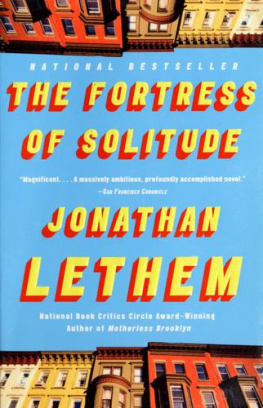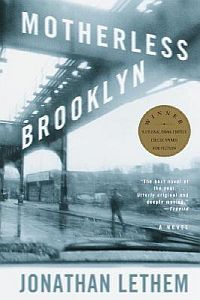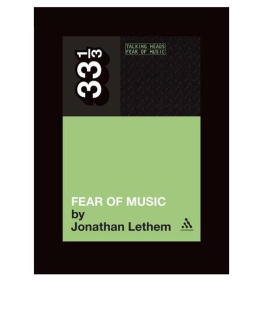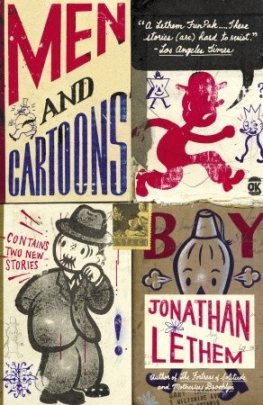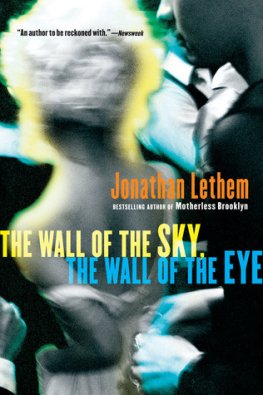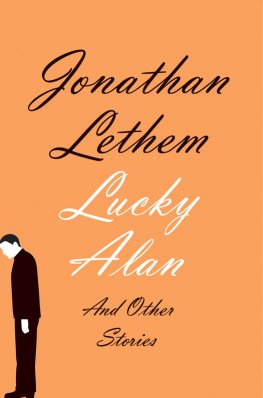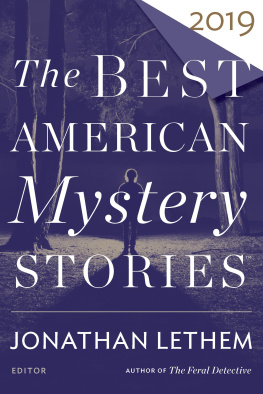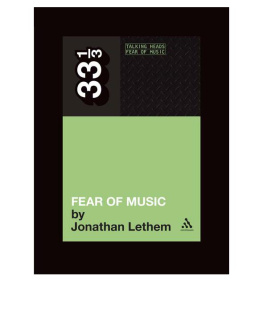Jonathan Lethem - The Fortress of Solitude
Here you can read online Jonathan Lethem - The Fortress of Solitude full text of the book (entire story) in english for free. Download pdf and epub, get meaning, cover and reviews about this ebook. year: 2003, publisher: RANDOM HOUSE, genre: Detective and thriller. Description of the work, (preface) as well as reviews are available. Best literature library LitArk.com created for fans of good reading and offers a wide selection of genres:
Romance novel
Science fiction
Adventure
Detective
Science
History
Home and family
Prose
Art
Politics
Computer
Non-fiction
Religion
Business
Children
Humor
Choose a favorite category and find really read worthwhile books. Enjoy immersion in the world of imagination, feel the emotions of the characters or learn something new for yourself, make an fascinating discovery.
- Book:The Fortress of Solitude
- Author:
- Publisher:RANDOM HOUSE
- Genre:
- Year:2003
- Rating:5 / 5
- Favourites:Add to favourites
- Your mark:
- 100
- 1
- 2
- 3
- 4
- 5
The Fortress of Solitude: summary, description and annotation
We offer to read an annotation, description, summary or preface (depends on what the author of the book "The Fortress of Solitude" wrote himself). If you haven't found the necessary information about the book — write in the comments, we will try to find it.
The Fortress of Solitude — read online for free the complete book (whole text) full work
Below is the text of the book, divided by pages. System saving the place of the last page read, allows you to conveniently read the book "The Fortress of Solitude" online for free, without having to search again every time where you left off. Put a bookmark, and you can go to the page where you finished reading at any time.
Font size:
Interval:
Bookmark:
Doubleday
new yorklondontorontosydneyauckland
Contents
For Mara Faye

chapter
L ike a match struck in a darkened room:
Two white girls in flannel nightgowns and red vinyl roller skates with white laces, tracing tentative circles on a cracked blue slate sidewalk at seven oclock on an evening in July.
The girls murmured rhymes, were murmured rhymes, their gauzy, sky-pink hair streaming like it had never once been cut. The girls parents had permitted them back onto the street after dinner, only first changing into the gowns and brushing their teeth for bed, to bask in the orange-pink summer dusk, the air and light which hung over the street, over all of Gowanus like the palm of a hand or the inner surface of a seashell. The Puerto Rican men seated on milk crates in front of the bodega on the corner grunted at the apparition, not sure of what they were seeing. They widened their lips to show one another their teeth, a display to mark patience, wordless enduring. The street strewn with bottle caps half-pushed into the softened tar, Yoo-Hoo, Rheingold, Manhattan Special.
The girls, Thea and Ana Solver, shone like a new-struck flame.
An old white woman had arrived on the block before the Solvers, to reclaim one of the abused buildings, one which had been a rooming house, replacing fifteen men with only herself and her crated belongings. She was actually the first. But Isabel Vendle only lurked like a rumor, like an apostrophe inside her brownstone, where at this moment she crept with a cane between the basement apartment and her bedroom in the old parlor on the first floor, to that room where she read and slept under the crumbled, unrestored plaster ceiling. Isabel Vendle was a knuckle, her body curled around the gristle of old injuries. Isabel Vendle remembered a day in a packet boat on Lake George, she scratched letters with a pen dipped in ink, she pushed stamps against a sponge in a dish. Her desktop was cork. Isabel Vendle had money but her basement rooms stank of rinds, damp newspaper.
The girls on wheels were the new thing, spotlit to start the show: white people were returning to Dean Street. A few.
Under the ailanthus tree in the backyard Dylan Ebdus at five accidentally killed a kitten. The Ebduses tenants in the basement apartment had a litter of them, five, six, seven. They squirmed on the ground there, in that upright cage of brick walls, among the rubble and fresh-planted vines and the musky ailanthus sheddings, where Dylan played and explored alone while his mother turned over ground with a small trident or sat smoking while the couple downstairs sang together, one strumming a peace-sign-stickered, untuned guitar. Dylan danced with the tiny, razor-sharp, bug-eyed cats, chased them into the slug-infested brick pile, and on the second day, backpedaling from one of the cats, crushed another with his sneakered foot.
Those basement tenants took the kitten away broken but alive while Dylan, crying, was hustled off by his parents. But Dylan understood that the kitten was mercifully finished somehow, smothered or drowned. Somehow. He asked, but the subject was smothered too. The adults tipped their hand only in that instant of discovery, letting Dylan glimpse their queasy anger, then muted it away. Dylan was too young to understand what hed done, except he wasnt; they hoped hed forget, except he didnt. Hed later pretend to forget, protecting the adults from what he was sure they couldnt handle: his remembering entirely.
Possibly the dead kitten was the insoluble lozenge of guilt hed swallowed.
Or possibly it was this: his mother told him someone wanted to play with him, on the sidewalk across the street. Out front. It would be his first time to go out on the block, to play out front instead of in the brick-moldy backyard.
Who?
A little girl, said his mother. Go see, Dylan.
Maybe it was the white girls, Ana and Thea in their nightgowns and skates. Hed seen them from the window, now they were calling to him.
Instead it was a black girl, Marilla, who waited on the sidewalk. Dylan at six recognized a setup when he saw one, felt his mothers city craftiness, her natives knowledge. Rachel Ebdus was working the block, matchmaking for him.
Marilla was older. Marilla had a hoop and some chalk. The walk in front of Marillas gateher share of the irregular slate path was her zonemarked. This was Dylans first knowledge of the system that organized the space of the block. He would never step into Marillas house, though he didnt know that now. The slate was her parlor. He had his own, though he hadnt marked it yet.
You moved here? said Marilla when she was sure Dylans mother had gone inside.
Dylan nodded.
You live in that whole house?
Tenants downstairs.
You got an apartment?
Dylan nodded again, confused.
You got a brother or sister?
No.
What your father does?
Hes an artist, said Dylan. Hes making a film. He offered it with maximum gravity. It didnt make much of an impression on Marilla.
You got a spaldeen? she said. Thats a ball, if you dont understand.
No.
You got any money on you?
No.
I want to buy some candy. I could buy you a spaldeen. Could you ask your mother for some money?
I dont know.
You know skully?
Dylan shook his head. Was skully a person or another kind of ball or candy? He couldnt know. He felt that Marilla might begin to pity him.
We could make skully caps. You could make them with gum or wax. You got a candle in your house?
I dont know.
We could buy one but you got no money.
Dylan shrugged defensively.
Your mother told me to cross the street with you. You cant do it yourself. Her tone was philosophical.
Im six.
Youre a baby. What kind of a name is Dylan?
Like Bob Dylan.
Who?
A singer. My parents like him.
You like the Jackson Five? You know how to dance? Marilla laced herself with her hoop, buckled her knees and elbows at once, balled her fists, gritted her teeth, angled her ass. The hoop swung. She grinned and jutted her chin at Dylan in time with her hips, as though she could have swirled another hoop around her neck.
When it was Dylans turn the hoop clattered to the slate. He was still fat, podlike, Tweedledee. There was no edge on his shape for the hoop to lodge. He could barely span it with his arms. He couldnt duck his knees, instead scuffed sideways, stepping. He couldnt dance.
That was how they played, Dylan dropping the plastic hoop to the ground a thousand times. Marilla sang encouragement, Oh, baby give me one more chance, I want you back . She punched the air. And Dylan wondered guiltily why the white girls on skates hadnt called to him instead. Knowledge of this heretical wish was his second wound. It wasnt like the dead kitten: this time no one would judge whether Dylan had understood in the first place, whether he had forgotten after. Only himself. It was between Dylan and himself to consider forever whether to grasp that hed felt a yearning preference already then, that before the years of seasons, the years of hours to come on the street, before Robert Woolfolk or Mingus Rude, before Play That Funky Music, White Boy, before Intermediate School 293 or anything else, hed wished, against his mothers vision, for the Solver girls to sweep him away into an ecstasy of blondness and matching outfits, tightened laces, their wheels barely touching the slate, or only marking it with arrows pointing elsewhere, jet trails of escape.
Next pageFont size:
Interval:
Bookmark:
Similar books «The Fortress of Solitude»
Look at similar books to The Fortress of Solitude. We have selected literature similar in name and meaning in the hope of providing readers with more options to find new, interesting, not yet read works.
Discussion, reviews of the book The Fortress of Solitude and just readers' own opinions. Leave your comments, write what you think about the work, its meaning or the main characters. Specify what exactly you liked and what you didn't like, and why you think so.

